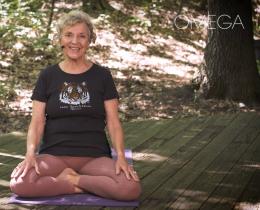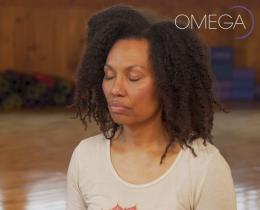Omega: How do those outside the military react to you being in the service and also being a yoga teacher? Have you received pushback?
Corwin: Yes, and it still catches me off guard. I never thought about what a big deal it would be for people to meet a Navy pilot who also meditates and practices yoga. I underestimated how confusing this could be for people. It made me really examine my experience and forced me to figure out what it meant for me to be a bridge to both sides—civilian and military. In the end, to me, both are about discipline, love, and service.
Omega: Which one of these is easiest for people to understand?
Corwin: Discipline is the one that people understand easiest. It takes discipline to have a yoga practice. It’s about showing up on the mat in truth and doing it even when you don’t feel like it that day because your mind is full, you’re stressed out, you ate too many cookies, and you can’t find your breath, let alone an ounce of serenity. To be able to be okay with that and practice anyway is discipline.
People often say to me that they could never make it in the military because they couldn’t take orders from someone else. But everyone takes orders; they just don’t realize it. It may not be in an authoritarian hierarchy of ranks like the military, but discipline comes from a place of respect.
When you agree to give yourself to something bigger (like your family or your work or your yoga practice), you are willing to accept not being at the top of the pyramid. When we do this, we feel more connected and become more disciplined. When we don’t, and we fight too hard or force things, we get injured (in yoga practice) or written up (in the military). I rebelled quite a bit in the military, and I’ve been injured in yoga as well from the same lack of discipline at times. Both have slowly taught me that discipline isn’t about subservience; it is simply how we show respect, whether to our body, our priorities, or our beliefs.
Omega: Love isn’t a word most people would associate with the military. How do you see it expressed?
Corwin: Luckily, my brother just returned safely from Afghanistan. He has two young children, was gone for the holidays, and missed all sorts of “firsts” for his kids. Another one of my close friends did not even meet his twin girls until he returned from deployment two months after their birth. To me, they represent the love of so many of our military personnel.
Nobody wants to be gone for birthdays, anniversaries, holidays, funerals, or births of their children; they simply love their families so much that they’re willing to sacrifice being away to support something larger than them. It doesn’t matter what your political beliefs are. I see this in many military members—it’s not a narrow nationalistic pride, it’s about doing what’s right for right’s sake, out of love.
The military is held to higher standards of behavior than most other organizations, and these responsibilities are taken seriously. When I first joined the military, I thought, "Well this isn't fair. Why am I held to these standards that those around me are not?" I realized the only answer to this was because these standards represent doing what’s right by each other.
The practice of yoga teaches us that finding compassion and love for the outside world can only start when we’ve found it for ourselves. We can’t share love with anyone else if we're not free inside—if we’re not truthful, honest, and kind to ourselves. Only then can we really hold space for others.
Omega: The term “being in the service” refers to being in the military, but many people don't think of it in the literal sense. Yet service is another place you find overlap with yoga.
Corwin: I’ve watched a lot of friends leave the military to pursue civilian careers, only to return a year or two later. Most respond that they just don’t feel the same sense of purpose on the outside, the same camaraderie. I think this is an innate human desire, to be of service, and it is something that is easily found when serving in uniform. I’m in the car right now on my way from Texas to Virginia Beach for eight months of active duty service. I’ve hit the “hold” button on everything in my personal and yoga life, and I’m okay with that. We serve by sacrificing our time and our lives for something larger. We don’t always see it as service when we’re in the thick of it, but in retrospect that’s what it is.
Many people find yoga at times in their lives when they are looking for something more. At first they only hear a whisper of a calling, but when they realize how much yoga is transforming their lives, they naturally want to give back and share it with others. That’s how I’ve felt with the military community. I want to respond to their service by serving them.
Omega: How are you working to make yoga more accessible to service members?
Corwin: The Give Back Yoga Foundation is a nonprofit I work closely with that does a lot of work with service members. Recently they partnered with Gaiam to create Yoga Readiness Kits to distribute to interested service members. With their support, I created a series of streaming yoga videos called Yoga for Warriors so that service members can practice no matter where they are stationed or deployed throughout the world.



